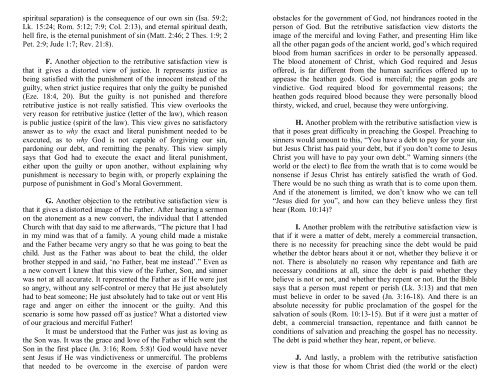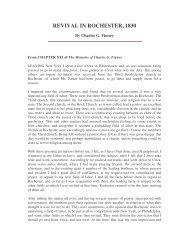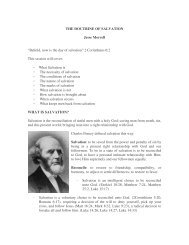Does_God_Take_Away_Free_Will_Jesse_Morrell 2.pdf - PinPoint ...
Does_God_Take_Away_Free_Will_Jesse_Morrell 2.pdf - PinPoint ...
Does_God_Take_Away_Free_Will_Jesse_Morrell 2.pdf - PinPoint ...
You also want an ePaper? Increase the reach of your titles
YUMPU automatically turns print PDFs into web optimized ePapers that Google loves.
spiritual separation) is the consequence of our own sin (Isa. 59:2;<br />
Lk. 15:24; Rom. 5:12; 7:9; Col. 2:13), and eternal spiritual death,<br />
hell fire, is the eternal punishment of sin (Matt. 2:46; 2 Thes. 1:9; 2<br />
Pet. 2:9; Jude 1:7; Rev. 21:8).<br />
F. Another objection to the retributive satisfaction view is<br />
that it gives a distorted view of justice. It represents justice as<br />
being satisfied with the punishment of the innocent instead of the<br />
guilty, when strict justice requires that only the guilty be punished<br />
(Eze. 18:4, 20). But the guilty is not punished and therefore<br />
retributive justice is not really satisfied. This view overlooks the<br />
very reason for retributive justice (letter of the law), which reason<br />
is public justice (spirit of the law). This view gives no satisfactory<br />
answer as to why the exact and literal punishment needed to be<br />
executed, as to why <strong>God</strong> is not capable of forgiving our sin,<br />
pardoning our debt, and remitting the penalty. This view simply<br />
says that <strong>God</strong> had to execute the exact and literal punishment,<br />
either upon the guilty or upon another, without explaining why<br />
punishment is necessary to begin with, or properly explaining the<br />
purpose of punishment in <strong>God</strong>’s Moral Government.<br />
G. Another objection to the retributive satisfaction view is<br />
that it gives a distorted image of the Father. After hearing a sermon<br />
on the atonement as a new convert, the individual that I attended<br />
Church with that day said to me afterwards, “The picture that I had<br />
in my mind was that of a family. A young child made a mistake<br />
and the Father became very angry so that he was going to beat the<br />
child. Just as the Father was about to beat the child, the older<br />
brother stepped in and said, ‘no Father, beat me instead’.” Even as<br />
a new convert I knew that this view of the Father, Son, and sinner<br />
was not at all accurate. It represented the Father as if He were just<br />
so angry, without any self-control or mercy that He just absolutely<br />
had to beat someone; He just absolutely had to take out or vent His<br />
rage and anger on either the innocent or the guilty. And this<br />
scenario is some how passed off as justice? What a distorted view<br />
of our gracious and merciful Father!<br />
It must be understood that the Father was just as loving as<br />
the Son was. It was the grace and love of the Father which sent the<br />
Son in the first place (Jn. 3:16; Rom. 5:8)! <strong>God</strong> would have never<br />
sent Jesus if He was vindictiveness or unmerciful. The problems<br />
that needed to be overcome in the exercise of pardon were<br />
obstacles for the government of <strong>God</strong>, not hindrances rooted in the<br />
person of <strong>God</strong>. But the retributive satisfaction view distorts the<br />
image of the merciful and loving Father, and presenting Him like<br />
all the other pagan gods of the ancient world, god’s which required<br />
blood from human sacrifices in order to be personally appeased.<br />
The blood atonement of Christ, which <strong>God</strong> required and Jesus<br />
offered, is far different from the human sacrifices offered up to<br />
appease the heathen gods. <strong>God</strong> is merciful; the pagan gods are<br />
vindictive. <strong>God</strong> required blood for governmental reasons; the<br />
heathen gods required blood because they were personally blood<br />
thirsty, wicked, and cruel, because they were unforgiving.<br />
H. Another problem with the retributive satisfaction view is<br />
that it poses great difficulty in preaching the Gospel. Preaching to<br />
sinners would amount to this, “You have a debt to pay for your sin,<br />
but Jesus Christ has paid your debt, but if you don’t come to Jesus<br />
Christ you will have to pay your own debt.” Warning sinners (the<br />
world or the elect) to flee from the wrath that is to come would be<br />
nonsense if Jesus Christ has entirely satisfied the wrath of <strong>God</strong>.<br />
There would be no such thing as wrath that is to come upon them.<br />
And if the atonement is limited, we don’t know who we can tell<br />
“Jesus died for you”, and how can they believe unless they first<br />
hear (Rom. 10:14)?<br />
I. Another problem with the retributive satisfaction view is<br />
that if it were a matter of debt, merely a commercial transaction,<br />
there is no necessity for preaching since the debt would be paid<br />
whether the debtor hears about it or not, whether they believe it or<br />
not. There is absolutely no reason why repentance and faith are<br />
necessary conditions at all, since the debt is paid whether they<br />
believe is not or not, and whether they repent or not. But the Bible<br />
says that a person must repent or perish (Lk. 3:13) and that men<br />
must believe in order to be saved (Jn. 3:16-18). And there is an<br />
absolute necessity for public proclamation of the gospel for the<br />
salvation of souls (Rom. 10:13-15). But if it were just a matter of<br />
debt, a commercial transaction, repentance and faith cannot be<br />
conditions of salvation and preaching the gospel has no necessity.<br />
The debt is paid whether they hear, repent, or believe.<br />
J. And lastly, a problem with the retributive satisfaction<br />
view is that those for whom Christ died (the world or the elect)









![[PDF] SIX DAYS OR MILLIONS OF YEARS? - Answers in Genesis](https://img.yumpu.com/34887318/1/190x245/pdf-six-days-or-millions-of-years-answers-in-genesis.jpg?quality=85)






